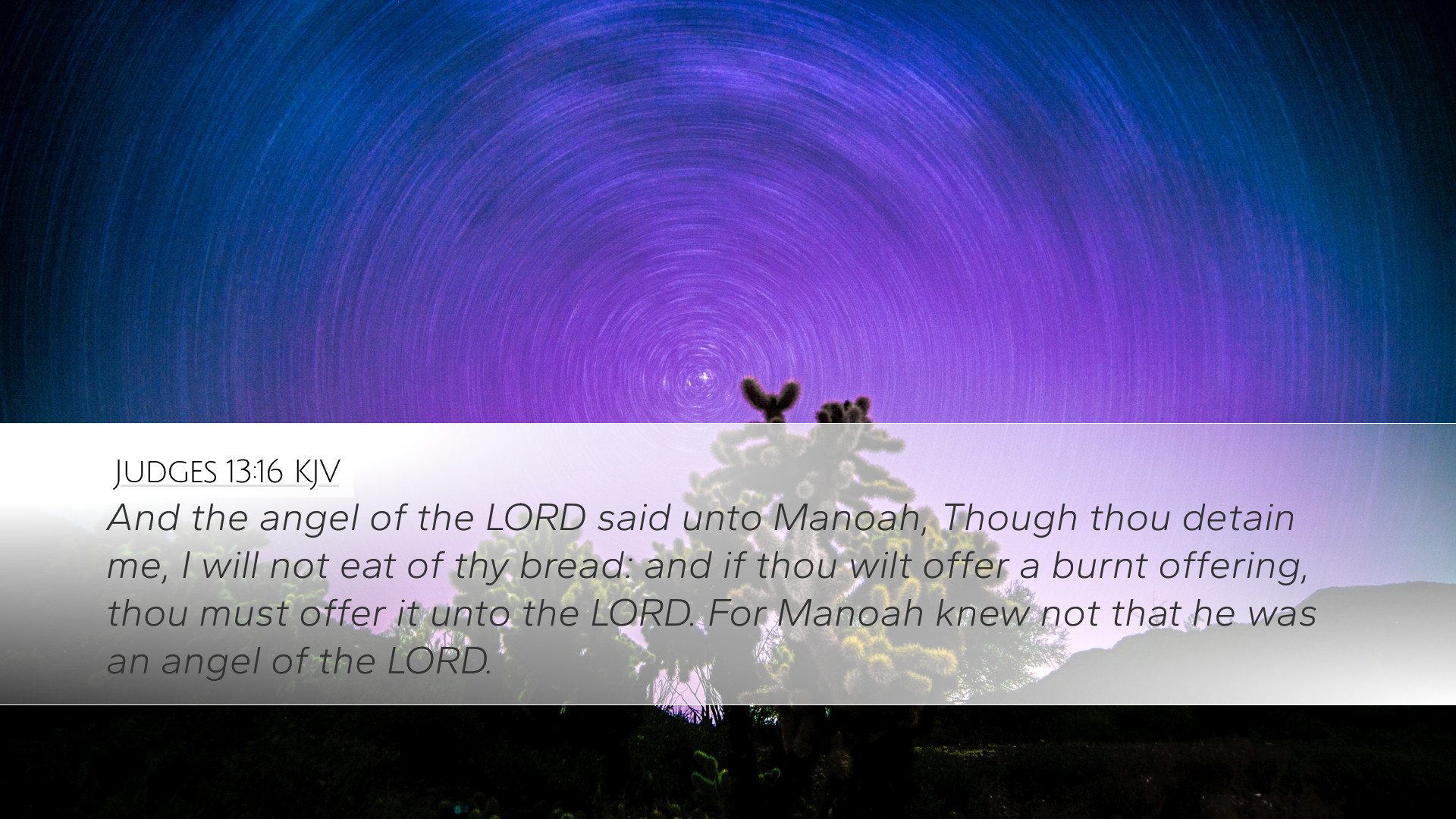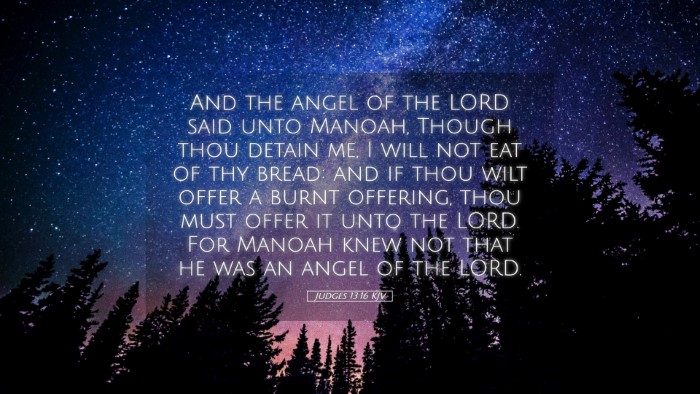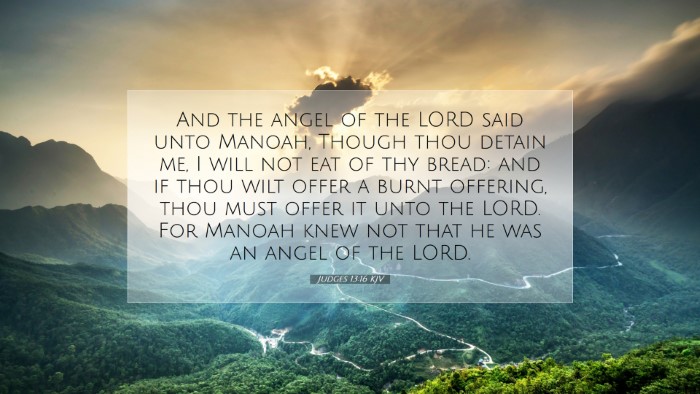Commentary on Judges 13:16
Judges 13:16 (KJV) states: "And the angel of the Lord said unto Manoah, Though thou detain me, I will not eat of thy bread; and if thou wilt offer a burnt offering, thou must offer it unto the Lord." This verse provides essential insights into the nature of divine communication and the significance of offerings in worship. Below is a summarized commentary drawn from various public domain commentators.
Contextual Overview
The narrative in Judges 13 describes the announcement of the birth of Samson, a pivotal figure in Israel’s history. Manoah and his wife are visited by an angel who reveals God's plan for their son. This context is key to understanding the implications of Manoah's hospitality and the angel's response.
Insights from Public Domain Commentaries
1. Matthew Henry’s Commentary
Divine Detachment: Matthew Henry emphasizes the angel's response as a demonstration of divine detachment from earthly needs. The angel states unequivocally that he will not eat of Manoah's bread. This suggests the angel's nature as a spiritual being, highlighting that God does not require physical sustenance from man. This has broader implications for understanding God’s self-sufficiency and the heavenly realm's independence from human offerings.
Offerings to God: Furthermore, Henry points out that if Manoah wishes to offer a burnt offering, it must be directed toward the Lord. This instruction reaffirms the centrality of God in worship. It stresses that all acts of worship, including offerings, should honor God and acknowledge His sovereignty. Manoah's intentions must align with divine purposes, steering the understanding of acceptable worship.
2. Albert Barnes’ Notes on the Bible
Angel’s Refusal: Albert Barnes elaborates on the angel's refusal of Manoah's hospitality, suggesting it serves as a lesson in prioritizing worship over personal benefit. The refusal underscores the idea that obedience to divine commandments transcends the act of physical offerings. Barnes notes that the act of giving offerings should arise from a heart dedicated to God rather than a desire for reciprocal blessings.
Meaning of Burnt Offerings: Regarding the burnt offerings, Barnes underscores their significance in the ancient Israelite worship system. Burnt offerings were expressions of total dedication and atonement. By directing Manoah to offer the sacrifice unto the Lord, the angel emphasizes that true worship involves complete surrender and acknowledgment of God’s holiness.
3. Adam Clarke’s Commentary
Spiritual Significance: Adam Clarke provides a detailed analysis of the spiritual implications behind the interaction. He observes that the refusal to eat symbolizes a distancing from the material and a focus on the spiritual dimension of worship. Clarke highlights that this interplay reflects the nature of true service to God: it is spiritually motivated rather than materially rewarded.
Concept of Detaining: In Clarke’s view, the notion of "detaining" the angel reflects humanity's tendency to seek favor through physical means. However, the angel’s insistence on not being detained for mere physical nourishment is a call to elevate spiritual pursuits above earthly concerns. This act calls believers to reassess their motivations for worship and service.
Theological Implications
In examining Judges 13:16 through these commentators, we can derive several important theological implications.
- God’s Sovereignty: The narrative reveals God's absolute sovereignty. He is not dependent on human offerings, as shown by the angel's refusal to partake in Manoah's bread.
- True Worship: Worship must be directed toward God and rooted in a desire for relationship rather than mere ritual. Manoah's intended offering should arise from a genuine heart seeking God's favor.
- Spiritual versus Material: The text prioritizes spiritual realities over material concerns. The divine messenger is not swayed by earthly hospitality and directs worship to be a matter of the heart.
Practical Application
For pastors, students, and theologians, several practical applications emerge from this commentary:
- Reassess Worship Practices: Evaluate if worship practices reflect a heart truly devoted to God, aligning with biblical principles of sacrifice and offerings.
- Cultivate Spiritual Awareness: Foster an understanding within congregations that God desires spiritual engagements over mere ritualistic offerings. Engage believers in conversations regarding the meaning behind their traditions.
- Encourage Obedience and Dedication: Reinforce the notion that offerings—be they time, talents, or resources—should emerge from a place of obedience to God’s call, promoting a holistic approach to Christian living.
Conclusion
Judges 13:16 stands as a profound teaching point about divine nature, worship, and obedience. By synthesizing insights from Matthew Henry, Albert Barnes, and Adam Clarke, we glean a comprehensive understanding of this passage that challenges believers to pursue a deeper relationship with God through genuine worship and dedication. As we navigate our spiritual journeys, may our hearts align with divine intentions, and may our offerings be a true reflection of our adoration for the Lord.


